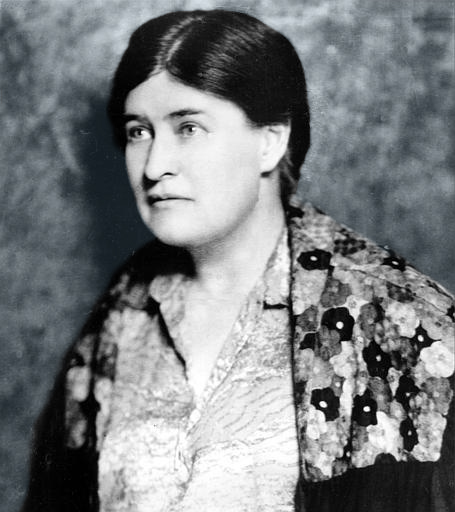
Pulitzer Prize-winning novelist Willa Cather writes to author Dorothy Canfield Fisher, who was one of the nation’s earliest advocates for universal literacy and lifelong education, as well as a powerful voice in racial and gender equality movements. In the letter, Cather refers to a lecture she gave on Canfield Fisher’s novel, The Bent Twig (1915). This letter was written at the height of Cather’s career, in between the second and third installments of her Prairie Trilogy.
September 2 1916
Red Cloud
My Dear Dorothy:
I have just dropped down in Red Cloud after three glorious months in New Mexico and Wyoming. My brother Roscoe lives up in the Wind River mountains in Wyoming, and he has an interesting German wife and a little girl of five and cunning girl twins with whom I had the most fun. Here is a picture of them playing with me in their lovely back yard which has a mountain river rushing through it. We rode home—back from over the wildest mountain trails, and I was “requested to speak” on “The Bent Twig” to a bridge club! If I could remember my remarks, I’d write them to you.
I think it’s funny that we both hit on rather the same method of treatment for such very different characters. And I think in both books the early part, and the American small town, came out the best, though you do it rather from the standpoint of the law-maker and I from that of the law-breaker, or at least of the rebel who bootlessly kicks against the pricks. I feel rather like poor Molly, who bolted out of the moral law in her car. That’s the best use for a car I’ve ever discovered. If the Army of Unalterable Law closes in on me too hard, I’d escape like Molly, so I would. I do like the naughty ones, Molly and Aunt Victoria, better than the 90 and 9 obedient—except the mother; on the whole I think she is the dominating figure of the book. I don’t feel that she particularly enjoyed her own scheme of life, Dorothy, only that her intelligence was too good to deceive herself. Here’s a recast: There was just such a Maine woman who used to come to spend the afternoon with Fremstad once when I was visiting O.F. in Maine. What a beautiful, noble, sad—and humorous—face she had. She knew all about O.F. (how she was made) God knows how, but she did. Two of her sons had just had their eyes blown out dynamiting orchards, and her dignity and graciousness under such a misfortune was beyond anything. It was so interesting to see the two women together—so much wisdom in one and so much force in the other. I used to go about thanking God that Fremstad didn’t know as much as the farm woman, for if she had she would not have been any good,—See? If she had seen what the other woman saw she positively couldn’t have lifted a leg to sing a part, ever. Great wisdom is like Nirvana—it takes the “pep” out of people. You know I always liked the Romans because they were so non-wise and so full of “pep.” It’s blooming full-blooded ignorance that makes the bright show, after all. And, my dear, whether it’s a wheat-thrashing or an opera, it’s the Bright Show that I love. I can’t help it. It’s like hearing the band play when you are little; my feet begin to move, and nothing else makes them move, alas!
Do you know that in Lincoln [,Nebraska] my readers and your readers—please don’t be insulted if I tell you that yours outnumber mine 20 to 1—always fight whenever our names come up? Yours say insulting things about me, and mine say drastic things about you. Yours say they can’t read me because it’s all rot and most immoral, and mine (only about six) say they can’t read you because you are dull. You have the Geres, and the Westermanns, alas for me, and the university people, and Will Own Jones—you’re welcome to him, madame—and I have five German brewers and Sarah Harris, who still cries out to a deaf world that Bessie Tuttle and I are Geniuses. But they never do discuss us like ladies, their eyes begin to snap and they begin to buzz like hornets. Mariel [Gere] is especially bitter agin poor me; she says that just because my bad morals are not very vulgar they are the more insidious and that there is a flavor about me she simply can’t stand. I like the Geres and dearly love the Westermanns, and I was a good deal hurt at first, but there’s nothing to do but get what fun I can out of their loyalty to you. Old father Westermann you never got away from me, for he was really a brewer at heart, and old Dr. [Julius] Tyndale’s life is one long warfare agin your admirers. I wish you could go to Lincoln. My Public tactfully tell me all that your Public say about me, and cry imploringly “She didn’t live with him in Mexico anyhow, did she?”
Father and Mother are both well, all the nieces and nephews handsome and happy, and grown brothers and sisters coming and going, checking baggage in and checking out like a hotel. It’s very jolly to be here.
Lovingly
Willa
From Selected Letters of Willa Cather. New York: Knopf, 2013. pp. 230-231.
FURTHER READING
Read Dorothy Canfield Fisher’s short story “Sex Education,” introduced by Dan Chaon for The Center for Fiction.
Read Cather’s 1905 short story “Flavia and Her Artists,” which, due to its ostensible parody of Canfield Fisher’s mother (Flavia Canfield), contributed to a significant rift in the pair’s friendship.
Learn more about the lifelong friendship of Willa Cather and Dorothy Canfield Fisher at the Willa Cather Archive, curated by the University of Nebraska in Lincoln.


